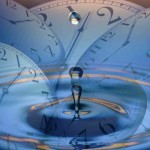 The following excerpt is taken from God in Our Midst by Daniel Hyde.
The following excerpt is taken from God in Our Midst by Daniel Hyde.
Right after you were born, the blood and vernix on your body was washed off by a nurse or even your mom or dad. Have you taken a bath or shower since the day you were born? Of course you have. Our bodies continually become dirtied, requiring new cleansing. It is the same way with us spiritually. Even after we are born again by the Spirit of God (John 3:1–8), we continue to sin. We have to be washed for the first time by Jesus, but He also continues to wash us of our sins.
The Lord said to Moses, “You shall also make a basin of bronze, with its stand of bronze, for washing. You shall put it between the tent of meeting and the altar, and you shall put water in it, with which Aaron and his sons shall wash their hands and their feet. When they go into the tent of meeting, or when they come near the altar to minister, to burn a food offering to the Lord, they shall wash with water, so that they may not die. They shall wash their hands and their feet, so that they may not die. It shall be a statute forever to them, even to him and to his offspring throughout their generations.” (Exodus 30:17-21)
The bronze basin filled with water was not placed in the midst of the tabernacle courtyard for a once-for-all initial washing, after which it became a useless relic. It had to be used continually. God required the priests to wash “when they go into the tent of meeting, or when they come near the altar to minister” (Ex. 30:20). How many times was that? It was as many times as they entered the tent, offered a sacrifice, or lifted up a prayer. They had to wash every time with no exceptions, which means they had to do so every day.
This is a great lesson for us today. We live in a time when the gospel of salvation has been divorced from the ordinary and everyday Christian life. With modern methods of crusade evangelism and seeker-sensitive worship services in which the focus is on unbelievers, most Christians today think that the “gospel” is something that we tell unbelievers so that they might be saved. We had to hear it long ago to be saved, and unbelievers now need to hear it to be saved. But we learn something different from this part of Exodus 30. We learn that God’s people, who are described in both the Old and New Testaments as “a kingdom of priests” (Ex. 19:6; 1 Peter 2:9), must constantly hear the good news of the gospel and constantly apply its cleansing to their hearts.
Just as the priests had to be washed again and again, we need to be washed continually by the good news that Jesus’ blood and Spirit have cleansed and continue to cleanse us of our sins. The Apostle John told ancient Christians: “My little children, I am writing these things to you so that you may not sin. But if anyone does sin, we have an advocate with the Father, Jesus Christ the righteous. He is the propitiation for our sins” (1 John 2:1–2a).
